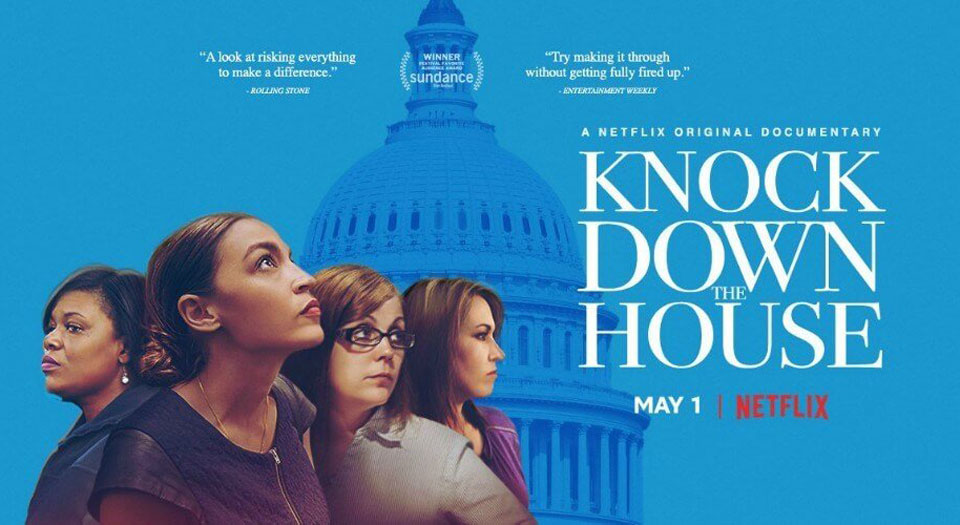
May Day seems like an auspicious time to release director/co-writer/co-producer/co-cinematographer Rachel Lears’s Sundance award-winning documentary Knock Down the House, which focuses on the primary challenges of four left-leaning women taking on establishment politicians in 2018’s Democratic primaries. Lears selected so-called “insurgents” who were backed by the liberal groups Justice Democrats and Brand New Congress, political action committees (PAC’s) that supported candidates who refused corporate and lobbyist funding.
Lears, who does not possess the gift of prophecy, chose a quartet of women without knowing if all, or any, of the contenders would win their primary and general election races. The foursome included: Amy Vilela, Paula Jean Swearengin, Cori Bush and Alexandria Ocasio-Cortez. Fortunately, AOC’s upset victory over longtime congressional leader Joe Crowley—a corporate Democratic hack and hawk who stupidly voted to authorize the Iraq War and unleash the dogs of hell—turned the Bronx resident, the youngest woman ever elected to the House of Representatives, into a nationally prominent figure who has parlayed her high profile into a leadership platform. As such, the charming, attractive, strategic thinking, brainy Ocasio-Cortez dominates this 86-minute nonfiction film, which uses fly-on-the-wall cinema vérité techniques to tell its exciting story.
I had the opportunity to personally encounter two of the challengers at a 2018 forum presented by progressive talent agent Paul Alan Smith at his Equitable Stewardship for Artists offices in L.A. Both Amy Vilela, who ran for a House seat in Nevada’s 4th District and Paula Jean Swearengin, who opposed U.S. Senator Joe Manchin in West Virginia, had compelling stories to tell. A health insurance tragedy induced Vilela to seek office. Similarly, another systemic outrage prompted Cori Bush (who was not present at Smith’s L.A. event) to run for the House in St. Louis: The 2014 police shooting death of unarmed Black youth Michael Brown and the Ferguson movement that emerged afterward. In terms of screen time, Ms. Bush arguably gets short shrift and is almost lost in Knock’s shuffle.
In my view, the candidate/“character” with the most captivating personal tale to tell in her hillbilly twang is Swearengin, a coalminer’s daughter with a harrowing saga of environmental, health and class-struggle stories. Although Paula Jean seems to be a W.A.S.P., her real-life experiences in a devastated West Virginia were arguably more upsetting and oppressive than AOC’s growing up Puerto Rican in the Bronx. She shows that instead of enjoying “white privilege,” exploited, immiserated Caucasians have far more in common with the wretched of the Earth than they do with the coal, oil, fracking and other tycoons that lay waste to West Virginia and beyond. I admit to being biased in favor of Paula Jean, a real working-class heroine, whom I not only had the honor to meet at Smith’s panel but to interview twice. (See here and here.) After AOC, Swearengin seems to have the most screen time in Knock.
Having said that, it’s the quartet’s sole winner, 29-year-old extremely photogenic knockout Alexandria who steals Knock’s show. There are great scenes of the contender waiting on tables and bartending during her uphill fight against Crowley reminding us that, like the rest of these gals, working-class folks like AOC who don’t look like Crowley aren’t supposed to serve in Congress. With its behind the scenes camerawork Knock gives us an up-close and personal look at the new reputedly “insurgent” freshmen/women who have made this the most representative House of Representatives in terms of ethnicity and gender in U.S. history. Like Norah Shapiro’s 2018 Time for Ilhan (which I imagine is already outdated), Lears and her husband Robin Blotnick, have chronicled the new incoming “progressives.”
However, Knock ignores important points, which presumably reflect the filmmakers’ own mindsets and prejudices. Their doc only briefly mentions the Democratic Socialists of America in passing and, if memory serves correctly, Knock never mentions that AOC is a card-carrying dues-paying member of this leftwing organization. Lears almost totally ignores whatever role the DSA, arguably the largest self-avowed socialist organization in the USA today, may or may not have played in AOC’s campaign and underdog victory. Inquiring minds want to know! (In late-breaking local news, Kristina Wong, another self-avowed DSA member, was just elected to serve on a neighborhood council seat in L.A.’s Koreatown.)
Furthermore, it is also probably intentional that Lears never examines what “socialism” means to AOC. Her bold Green New Deal plan, like that other self-avowed socialist’s, Sen. Bernie Sanders’s Medicare-for-all proposal—two of America’s most important policy prescriptions—seem to spring from socialistic principles. What distinguishes AOC and her other newly minted House comrade, Rashida Tlaib, is that they belong to a socialist organization. This more than anything else is what sets them apart from the hundreds of other members of the House of Reps. Yet Lears completely overlooks what is perhaps the most salient, uniquely distinguishing feature of AOC and her firebrand brand of left-leaning politics.
As said, Lears focuses on the primaries but Knock likewise never explores how “progressive” one can be and still belong to the corporate-dominated wing of the Democratic Party, which counsels caution precisely when courage and bold action are required. In the end, should AOC and her comrades try to take over the Democratic Party or should they form a new leftist party? Will the newcomers Knock Down the House, or will the House knock them down? Knock never considers these questions.
Can socialism be achieved through the electoral process without a revolution? Some might answer in two words: Salvador Allende. Many others are taking first things first, overturning the Trump regime and then building long-term on that success.
Previously, with Blotnick, who also co-made Knock, Lears co-created 2014’s The Hand That Feeds, which according to IMDB.com, describes as: “Shy sandwich-maker Mahoma López unites his undocumented immigrant coworkers to fight abusive conditions at a popular New York restaurant chain.”
For an insider look at the 2018 primary race, their new nonfiction film is essential, enjoyable viewing. However, for those with more discerning eyes attempting to analyze what it all means politically in terms of 2019’s class struggle, I don’t mean to knock Knock, but that insightful doc remains to be made.
Knock Down the House is in select theaters and on Netflix May 1. The trailer can be viewed here.
Aloha Oe, John Singleton. Farewell to thee, one of the greats.












Comments